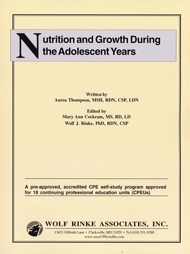|
Practical strategies to help you teach
adolescents how to fuel their body in a manner that will allow them
increased autonomy in the decision process. Topics include sexual maturation,
assessing the teen, fueling for sport, eating disorders, and other risky
behaviors.
Upon successful completion of this learning activity, the student should
be able to:
- Demonstrate effective communication strategies leading to behavior
changes in the adolescent client.
- Apply effective teaching strategies leading to behavior changes
in the adolescent client.
- Assess the nutritional adequacy of a teen's diet.
- Identify the specific nutrient needs of the adolescents as their
body develops and matures.
- Promote current dietary recommendations to reduce the risk of chronic
disease.
- Recognize what influences the food choices of the adolescent.
- Describe risks of eating disorders to the adolescent.
- Implement therapeutic approaches that will enable the eating disorder
clients to recover.
- Assist the obese adolescent to embrace healthy weight loss measures.
- Calculate the fuel needs for the athletic teen and plan meals to
enhance peak performance.
- Identify common ergogenic aids the adolescent may use to gain the
competitive edge.
- Identify a teen experiencing the female athlete triad and provide
dietary steps to aid in the recovery process.
- Counsel teens regarding the nutritional impact of risky behaviors.
Share with a friend and Save! Click here for important information about
sharing.
To order an ADDITIONAL Reporting Form click below:
| C318F |
18 CPEUs |
REPORTING FORM |
$70.00 |
|
Nutrition and Growth During the Adolescent Years
© 2024 Wolf Rinke Associates. All rights reserved for this self-directed accredited learning activity. Reproduction in whole or part without written permission, except for brief excerpts, is prohibited.
OBJECTIVES
Upon successful completion of this learning program, you will be better
able to:
- Identify the specific nutrient needs of adolescents as their bodies
develop and mature.
- Assess the nutritional adequacy of a teen's diet.
- Promote current dietary recommendations to reduce the risk of chronic
disease.
- Address the current health threats in adolescents such as obesity,
hypertension, and type 2 diabetes.
- Explain what influences the food choices of adolescents.
- Counsel adolescents regarding the risks of eating disorders.
- Implement therapeutic approaches that will enable the recovery of
eating disorder clients.
- Assist overweight or obese adolescents by embracing healthy weight
loss measures.
- Calculate the fuel needs for athletic teens and plan meals to enhance
peak performance.
- Identify common ergogenic aids adolescents may use to gain the competitive
edge.
- Instruct teens experiencing the female athlete triad and provide
dietary steps to aid in the recovery process.
- Counsel teens regarding the nutritional impact of risky behaviors.
- Demonstrate effective communication strategies leading to behavior
changes in adolescent clients.
ABOUT THE AUTHOR
Aurea R. Thompson, MSH, RDN, CSP is a member of the Academy of Nutrition and Dietetics. An Ohio native, she holds a B.S. in Dietetics from Eastern Michigan University, Ypsilanti, MI, where she completed a coordinated undergraduate program including an internship rotation through the University of Michigan hospital system. She then went on to complete her Master’s Degree in Health Science at the University of North Florida, Jacksonville, FL.
Aurea has more than 20 years of experience as a registered dietitian. She started her career as a public health nutritionist for the Nassau County Department of Health working in the WIC program. She went on to become the WIC Director for both Nassau and Baker County. In 1999, she left community dietetics to begin her clinical career as a dietitian at St Vincent’s Medical Center in Jacksonville, FL. During this time, she authored two publications for Ronald Watson’s series Nutrition and AIDS and AIDS and Heart Disease. In 2000, she was named “Young Dietitian of the Year” by the Jacksonville Dietetic Association and was recognized by the Florida Dietetic Association. She has been a pediatric dietitian at Wolfson Children’s Hospital since 2003 in Jacksonville, FL, where she currently specializes in pediatric and neonatal critical care nutrition. She has earned her Certification as a Specialist in Pediatric Nutrition through the Commission on Dietetic Registration since 2007. In addition to her hospital work, she writes a monthly nutrition article for Jax4kids, a publication that features local community topics and information with a focus on children and adolescents. She is a wife and busy mother of two.
Return to the top of page
If you prefer to order by phone, mail
or fax click below
or click here to contact us with
other questions.
For information about our other products and
services return to the sidebar at the top of the page.
|


